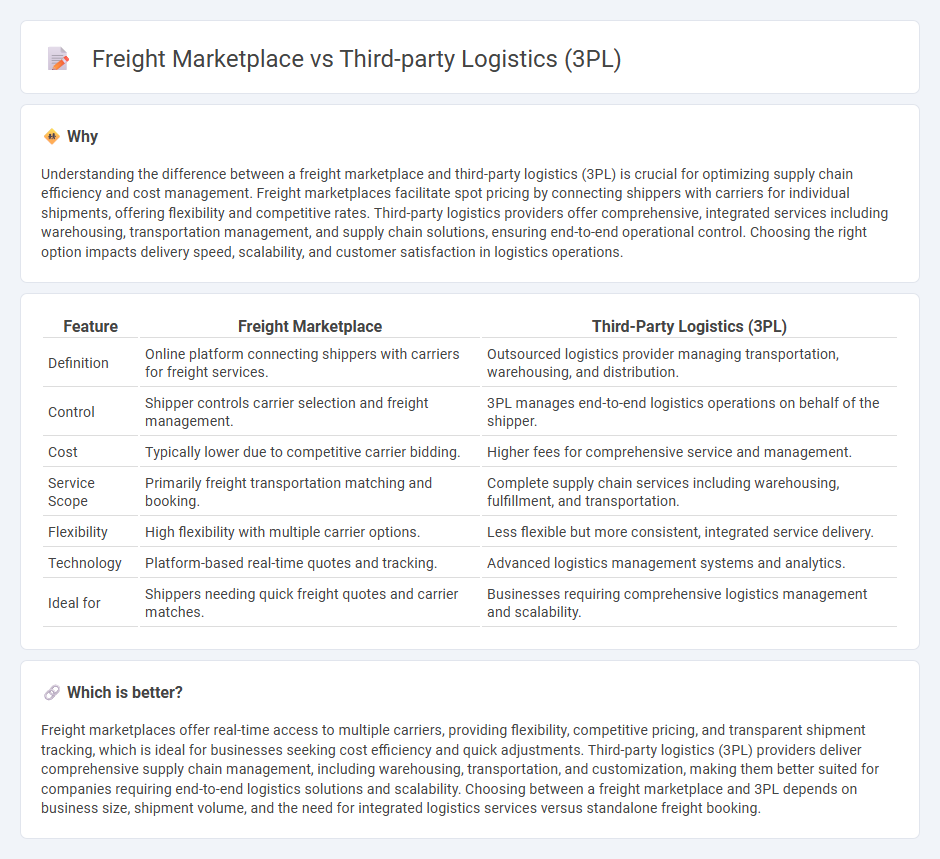
Freight marketplaces offer shippers a digital platform to compare rates and book transportation directly with carriers, enhancing transparency and cost-efficiency. Third-party logistics (3PL) providers manage end-to-end supply chain services, including warehousing, freight forwarding, and inventory management, delivering comprehensive logistics solutions. Explore how choosing between freight marketplaces and 3PL services can optimize your supply chain strategy.
Why it is important
Understanding the difference between a freight marketplace and third-party logistics (3PL) is crucial for optimizing supply chain efficiency and cost management. Freight marketplaces facilitate spot pricing by connecting shippers with carriers for individual shipments, offering flexibility and competitive rates. Third-party logistics providers offer comprehensive, integrated services including warehousing, transportation management, and supply chain solutions, ensuring end-to-end operational control. Choosing the right option impacts delivery speed, scalability, and customer satisfaction in logistics operations.
Comparison Table
| Feature | Freight Marketplace | Third-Party Logistics (3PL) |
|---|---|---|
| Definition | Online platform connecting shippers with carriers for freight services. | Outsourced logistics provider managing transportation, warehousing, and distribution. |
| Control | Shipper controls carrier selection and freight management. | 3PL manages end-to-end logistics operations on behalf of the shipper. |
| Cost | Typically lower due to competitive carrier bidding. | Higher fees for comprehensive service and management. |
| Service Scope | Primarily freight transportation matching and booking. | Complete supply chain services including warehousing, fulfillment, and transportation. |
| Flexibility | High flexibility with multiple carrier options. | Less flexible but more consistent, integrated service delivery. |
| Technology | Platform-based real-time quotes and tracking. | Advanced logistics management systems and analytics. |
| Ideal for | Shippers needing quick freight quotes and carrier matches. | Businesses requiring comprehensive logistics management and scalability. |
Which is better?
Freight marketplaces offer real-time access to multiple carriers, providing flexibility, competitive pricing, and transparent shipment tracking, which is ideal for businesses seeking cost efficiency and quick adjustments. Third-party logistics (3PL) providers deliver comprehensive supply chain management, including warehousing, transportation, and customization, making them better suited for companies requiring end-to-end logistics solutions and scalability. Choosing between a freight marketplace and 3PL depends on business size, shipment volume, and the need for integrated logistics services versus standalone freight booking.
Connection
Freight marketplaces serve as digital platforms that connect shippers with third-party logistics providers (3PL), streamlining the process of finding and booking transportation services. These marketplaces enhance supply chain efficiency by offering real-time pricing, capacity availability, and carrier options, enabling 3PL companies to optimize their freight management and expand their service reach. Integration of freight marketplaces with 3PL systems improves operational transparency, reduces costs, and accelerates delivery times across global logistics networks.
Key Terms
Outsourced Services
Third-party logistics (3PL) providers offer comprehensive outsourced services including warehousing, inventory management, and transportation coordination, enabling businesses to streamline supply chain operations efficiently. In contrast, freight marketplaces primarily serve as digital platforms connecting shippers with carriers, facilitating freight matching but typically without extensive operational management or value-added services. Explore the distinctions between 3PL and freight marketplaces to determine the optimal outsourced logistics solution for your business needs.
Platform Connectivity
Third-party logistics (3PL) providers offer integrated supply chain management with direct platform connectivity to carriers and shippers, optimizing freight scheduling and real-time tracking. Freight marketplaces leverage digital platforms to connect multiple shippers and carriers, enhancing transparency and competitive pricing through automated matching algorithms. Explore how platform connectivity shapes efficiency and cost-effectiveness in logistics solutions.
Carrier Selection
Third-party logistics (3PL) providers offer comprehensive carrier selection services using established networks and long-term partnerships to ensure reliability and negotiated rates. Freight marketplaces enable shippers to access a wide array of carriers in real-time, promoting competitive pricing and flexible options based on current availability. Explore the benefits of both solutions to optimize your carrier selection strategy.
Source and External Links
What is 3PL (third-party logistics)? | Definition from TechTarget - A 3PL provider offers outsourced logistics services, managing facets of procurement and fulfillment such as transportation and warehousing, allowing companies to control costs and focus on core competencies by outsourcing order fulfillment and shipping tasks.
What is a 3PL? Third-party logistics definition, process, and resources - A 3PL is a company that specializes in supply chain functions like inventory management, warehousing, order fulfillment, returns, and transportation to help businesses streamline operations and support growth.
How 3PLs Revolutionize Logistics and Supply Chain Management - 3PLs are specialized firms that businesses outsource logistics and supply chain functions to, including warehousing, transportation, packaging, and customs brokerage, enabling companies to enhance efficiency and focus on their core business.
 dowidth.com
dowidth.com